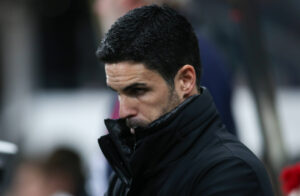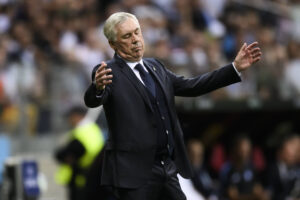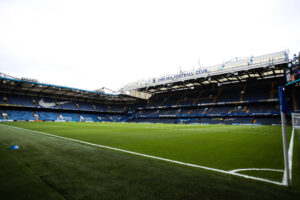As Manchester City’s multi-billionaire owner, Sheikh Mansour, is discovering, there are certain things that money cannot buy, and the UEFA Champions League is one of them. In fact, Manchester City have not just failed to win Europe’s greatest club competition in the near-decade that Mansour has owned them, it is arguable that they have failed to make any real impact in it at all.
Megabucks Manchester City Remain European Paupers
And after their latest elimination by Monaco this week, they may be further away from winning it than ever before, as the team and squad assembled so expensively over the last ten years faces major reconstruction.
It was on September 1, 2008 that Sheikh Mansour acquired Manchester City from its previous owner, the former Thai Prime Minister Thaksin Shinawatra, and the fact that the deal was effectively completed in less than 24 hours was probably the most potent illustration of the extraordinary wealth that Mansour brought to the negotiating table.
In the nine years since, Mansour has succeeded in his first aim of establishing City as a power in the Premier League, but the ultimate aim – winning the Champions League – remains frustratingly elusive.
It is instructive to compare City’s first decade under Mansour to Chelsea’s first decade under Roman Abramovich. Indeed, it is the obvious point of comparison, as Mansour was effectively trying to follow in Abramovich’s footsteps by transforming one of English football’s traditional under-achievers into a European superpower. Now, it must be acknowledged at the outset that City and Mansour were starting from a much lower base than Chelsea and Abramovich.
Chelsea may have been on the brink of bankruptcy when Abramovich bought the club from Ken Bates in the summer of 2003, but the team was still good enough to have qualified for the Champions League. By contrast, when Mansour bought Manchester City five years later, they were nowhere near the Champions League places. Indeed, only a few years previously they had been as low as the third tier of the English game – “Down Among the Dead Men”, as the subtitle of the Mark Hodkinson’s fine book about their time in the old Third Division put it.
Nevertheless, even allowing for that low starting-point, it is undeniable that City under Mansour have not achieved nearly as much as Chelsea under Abramovich, and it is in Europe that the contrast between the two is starkest. Chelsea not only won successive Premier Leagues in 2005 and 2006 in Jose Mourinho’s first period in charge but they also became, almost immediately, contenders for the Champions League.
Even under Claudio Ranieri and Avram Grant, they reached the 2004 semi-final and the 2008 final respectively, and under Guus Hiddink they would have reached the 2009 final but for an appalling refereeing performance in the second leg of the semi-final. Consequently, when Chelsea finally won the Champions League in 2012, it was the culmination of many years of near-misses, in which a stellar group of players – Petr Cech, John Terry, Frank Lampard and Didier Drogba, to name but the spine of the team – grew battle-hardened together before finally winning the ultimate prize.
Manchester City’s European record in the Sheikh Mansour era is not quite as impressive. Indeed, in their first two seasons in the Champions League, they crashed out at the group stage and it was only last season that they finally reached the semi-finals. However, even that relative success was quickly forgotten because of their unforgivably limp performance against the competition’s eventual winners, Real Madrid.
Of course, it was hoped that everything would change under Pep Guardiola, the architect of the great Barcelona team that denied Chelsea and everyone else in 2009 and 2011. If anything, however, after the relative success of reaching the last four a year ago, City appear to have gone backwards this year. Now, Guardiola and the club as a whole face a major summer rebuild, as so many of the best players of the last five years or so are either coming to the end of their City career (like Yaya Toure and, tragically, Vincent Kompany) or being shown the door by Guardiola (like Joe Hart and possibly even Sergio Aguero), as he deems them not good enough to win the Champions League.
Consequently, Manchester City have arrived in the unenviable position of being a domestic force but European minnows – megabucks or moneybags City at home, but European paupers. Of course, they are not alone in that, as there are several major European clubs that have done well in, or even dominated, their domestic league without ever winning the Champions League.
Arsenal under Arsene Wenger (Highbury Wenger, as opposed to Emirates Wenger) are the obvious example, but there are other big clubs with huge fan-bases that have never triumphed in either the European Cup or the Champions League, including Glasgow Rangers, Atletico Madrid, AS Roma and Spartak Moscow.
Even the mighty Juventus, the dominant power in Italian football for most of the 20th century, have won a relatively paltry pair of European Cups, which leaves them trailing behind their Milan rivals, AC and Inter, who have won seven and three European Cups/Champions Leagues respectively.
Why a team should do so well in its own country but then fail repeatedly in European competition is one of the great footballing conundrums. Of course, there are different factors at play for each club, but perhaps a common theme is the failure to adapt to the greater defensive demands of European football, where the concession of a goal at home (or three, in the case of City in their first leg against Monaco) can prove fatal.
Indeed, it is intriguing that perhaps the two greatest exponents of all-out attacking football in Europe during the last 20 years, Arsene Wenger and Pep Guardiola, have never quite lived up to their early promise in the Champions League. Wenger, of course, has never won the competition and almost certainly never will now (at least not with Arsenal), while Guardiola’s early successes with Barcelona increasingly look as if they were due largely to the genius of Lionel Messi, and the midfield mastery of Xavi and Andres Iniesta.
Even Sir Alex Ferguson, who always proclaimed to play attacking football at Manchester United, had to learn to temper his attacking instincts and improve his side’s defensive play before they could finally triumph in Europe.
Unlike Arsenal, City have a manager who has won the Champions League before and – equally, if not more importantly – the financial resources to compete with any of the established European superpowers such as Bayern Munich, Barcelona and Real Madrid.
Nevertheless, it will not be easy, as City’s own experience over the last ten years proves. For a start, they will need to buy almost an entirely new defence this summer, which will certainly be difficult in the current attack-crazy era of football, where it is virtually impossible to play offside and even the slightest touch by a defender on an attacker can be considered worthy of a penalty, as Luis Suarez’s swan-dive against PSG proved.
And even if they somehow find old-fashioned defenders, Guardiola will not only have to curb his own attacking instincts but somehow remain sufficiently patient to endure almost certain semi-final and final defeats before finally winning the Champions League, a process that, as Chelsea and others have demonstrated, can take many years.
Of course, there is another completely different route to European glory and it is the one being followed by Leicester City, the biggest surprise story in English football and now European football in probably the last 20 years. However, the Leicester approach of flirting with relegation before winning the Premier League, then full-on smooching with relegation before reaching the last eight of the Champions League (and possibly going even further) is a unique one and not easily copied by a club that has been as lavishly assembled as Manchester City.
Instead, Manchester City and Pep Guardiola will have to rebuild, probably slowly, before trying again next year to win the one trophy that their billions simply cannot buy.
Main Photo:






